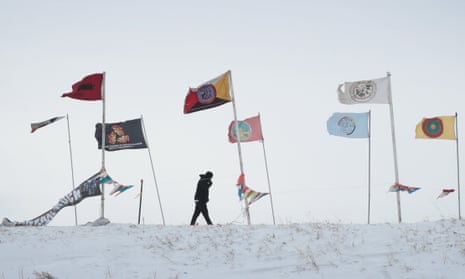Energy Transfer Partners, the company behind the Dakota Access pipeline, has responded to the Army Corps of Engineers’ denial of a key permit by asking a federal judge to allow it to drill under the Missouri river immediately.
The court filing came as thousands of activists remained at the Standing Rock encampments, despite being buffeted by a blizzard and a plea from a tribal council leader for them to return home.
The corps announced Sunday that it would not grant a permit – known as an easement – to the company, but would instead conduct an environmental impact statement and explore alternate routes for the 1,172-mile pipeline, which is slated to carry crude oil from the Bakken oil fields in North Dakota to a refinery in Illinois.
In documents filed in a US district court in Washington DC on Monday, lawyers for Energy Transfer Partners argued that the denial of permission by the US army corps of engineers represented a “transparent capitulation to political pressure”, which they implored the court to overrule and grant them permission to complete the pipeline.
The motion accused protesters of “an escalating campaign of violence and disorder”, and lawyers for Energy Transfer Partners claimed that the corps had previously granted permission for construction in the summer, and requested a summary judgment declaring the army corps’ decision null.
A hearing in the case is scheduled Friday.
Carl Tobias, a professor of law at the University of Richmond, said that the pipeline company’s argument – that it had already received permission to drill in August – was “not compelling”.
Jan Hasselman, a lawyer for the Standing Rock Sioux tribe, said that the pipeline company lacked a “strong argument” and that the filing was a “distraction”.
“DAPL basically claims it already received the easement,” Hasselman said. “The corps is in a better position to know what it did and did not do.”
Neither Energy Transfer Partners, nor their lawyers, responded to a request for comment.

The permit denial was a major victory for the Standing Rock Sioux tribe, which feared that the pipeline would contaminate their water source and destroy sacred sites. Thousands of Native American and environmental activists have joined “spiritual camps” on the banks of the Missouri river near the drilling site in protest of the pipeline.
Thousands of activists – who call themselves “water protectors” – remain at the sprawling encampments of tipis, hogans, tents and shelters, despite a blizzard that roared through North Dakota starting Monday afternoon, bringing snow, 40mph winds, and frigid temperatures.
The camps had received an influx of supporters over the weekend – including hundreds of US veterans – in response to evacuation orders from the army corps, which controls the land where the largest camp is based, and the North Dakota governor.
Those who were not hunkered down at the camps took shelter in school gymnasiums or a nearby casino, where the hallways and auditorium were packed with people stranded by unsafe travel conditions. A previously scheduled powwow took place in the auditorium, despite the dozens of sleeping bags spread on the floor.
The spirit of the encampments was alive in the hotel and concert venue. One man volunteered to help the housekeeping staff, which was short-staffed due to the storm. In the auditorium, the coat check was transformed into a makeshift childcare venue and the concessions stands hosted volunteers putting together peanut butter and jelly sandwiches. Medics from the camp set up shop in one corner to provide checkups, advice and hot tea.
Dave Archambault, the chairman of the Standing Rock Sioux tribal council, reiterated his request for “water protectors” to return home Tuesday, writing in a statement: “When this storm passes, it is time to dismantle the camp and return to our homes.”
Archambault said that the battle against the pipeline would now “pivot” to the courts, Trump administration and pipeline investors.
But many of the water protectors reject Archambault’s directive.
“The chairman does not tell us what to do. The chairman is not in charge of the camp,” Ladonna Bravebull Allard, the founder of the Sacred Stone spiritual camp, told the Guardian on Monday. “We stand. We don’t move. We don’t go nowhere.”
